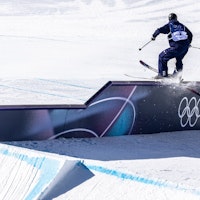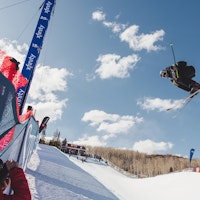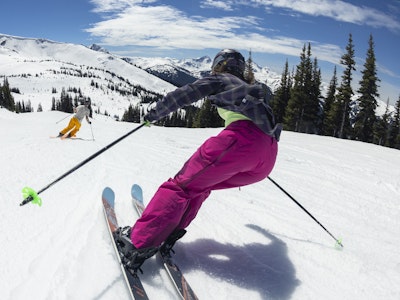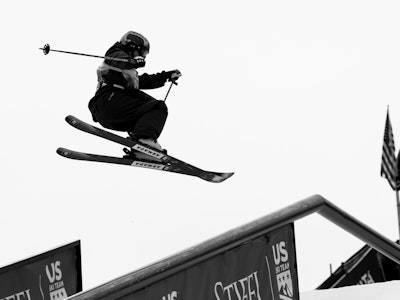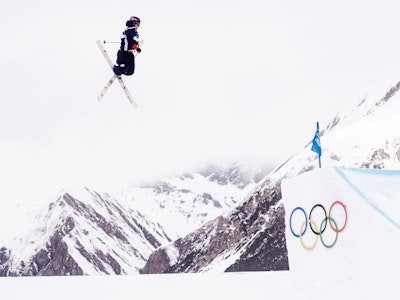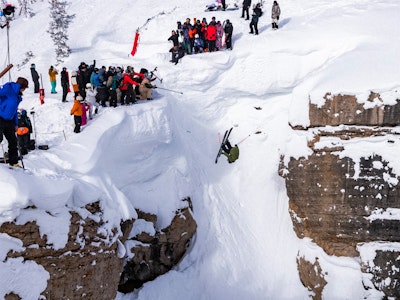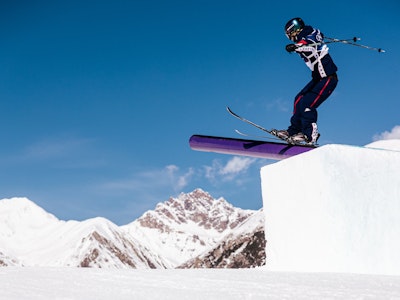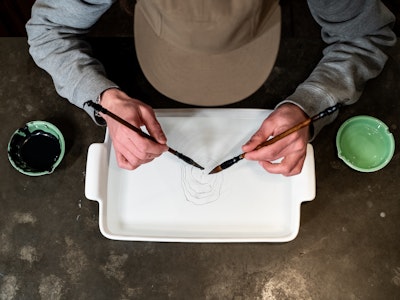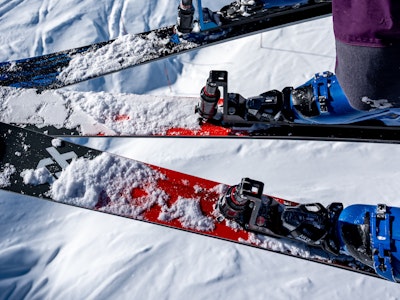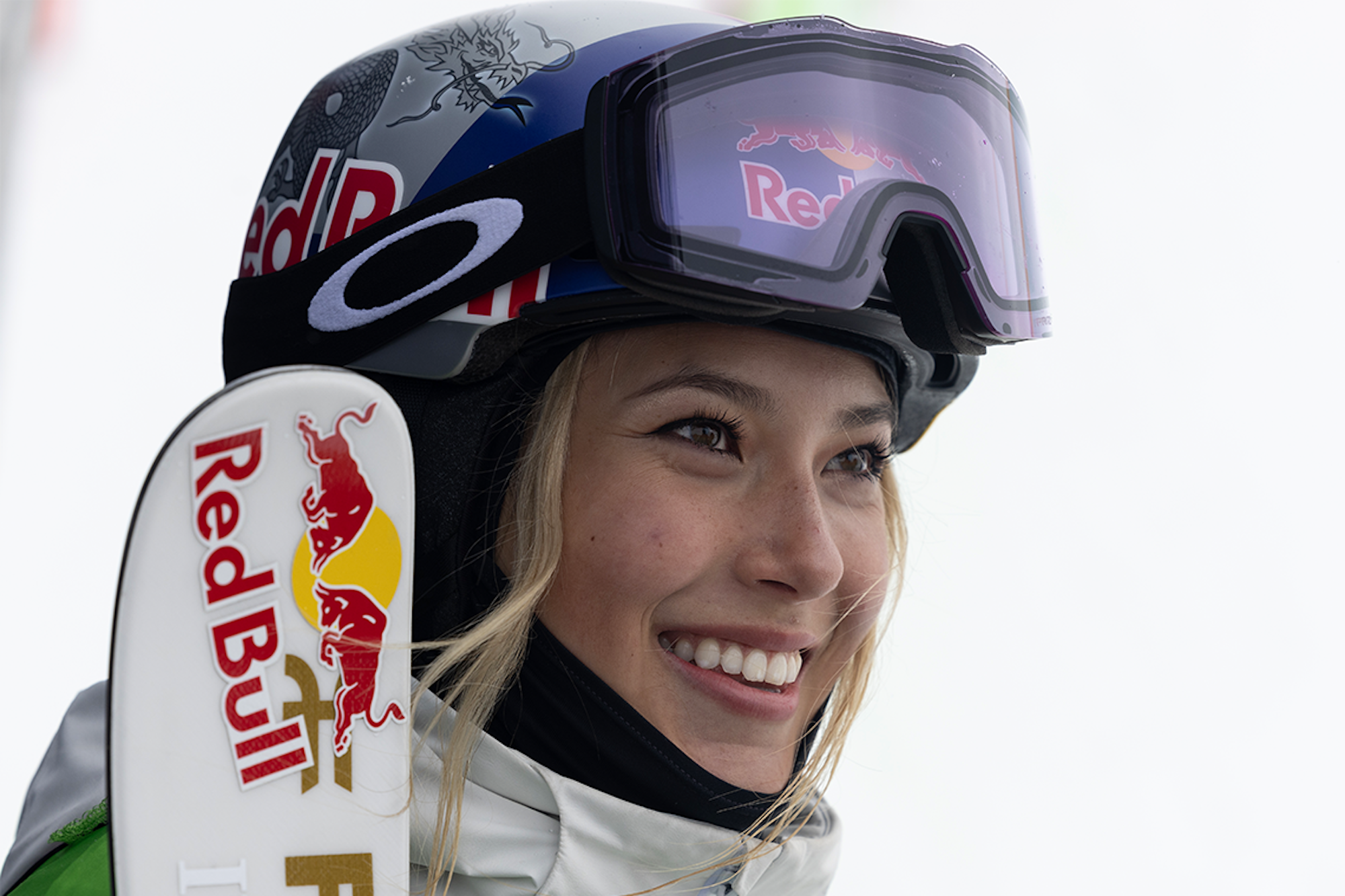All Images: Courtesy of the Winter Games NZ | Skier: Eileen Gu
After celebrating her 21st birthday on September 3rd, Eileen Gu received an incredible (and hard-earned) gift a few days later. Gu took first place in the FIS Women’s Halfpipe World Cup event during the Winter Games New Zealand. This was her 15th World Cup win, setting a new record and cementing Gu as the winningest skier is FIS Freeski World Cup history.
Friday’s qualifying cut left only eight women in the field, each battling for glory in Cardrona’s 22-foot Olympic halfpipe. The talented shapers of the Cardrona Park Crew put in the work to create a colossal freestyle course for the Winter Games NZ, and this immaculate halfpipe was the cherry on top. But if you were on the ground at Cardrona last weekend, you wouldn’t have been able to make out many of the features, or riders for that matter. Tumultuous winds and snow battered New Zealand’s South Island obscuring the vision of the halfpipe finalists and spectators.
With poise and determination, Gu laid down three incredible first-place runs. Her competition experience was ultimately a deciding factor, as she demonstrated patience and precision regarding her trick selection in such variable weather. Many athletes struggle in these conditions, as some push themselves too hard given issues with visibility and wind, and others play it too conservatively. However, this was not the case for Gu.

Eileen Gu laid down three near-flawless runs in the Women’s FIS World Cup Halfpipe Finals in Cardrona, NZ
She started her run with a giant right-side 900, scoring a 92.00 on her first outing. She raised the bar on her next run, gaining even more amplitude out of the pipe and dialing in her execution to improve her score to 94.50. By the time her third run came around, she had already secured the win, as no other competitors would be able to top her score. However, this didn’t stop her from pulling out all the stops for a surreal victory lap.
Her third run included a right-side cork 9 Buick grab, left-side cork 9 Japan, right-side 7 lead tail, switch left 7 Japan and left alley-oop flat spin 540 mute grab. For all this and more, she was awarded a score of 96.00 by the judges, who justified the high score by noting her, “good amplitude, variety of tricks, consistently good grabs and spinning tricks in four different directions,” according to the Winter Games NZ official press release. To put her incredible performance into perspective, no other skier in the Women’s Halfpipe field was able to achieve a score above 90.00 throughout the finals.
“The weather and the conditions did not make it easy today but it’s a testament to my love of skiing. Every new contest feels novel and exciting, there’s no complacency here, my goal is to continue pushing myself, pushing the sport, pushing women’s skiing. Seeing that record being broken today for men and women means a ton to me and it’s something I’ll carry with me and I hope to continue breaking records in the future.” – Eileen Gu
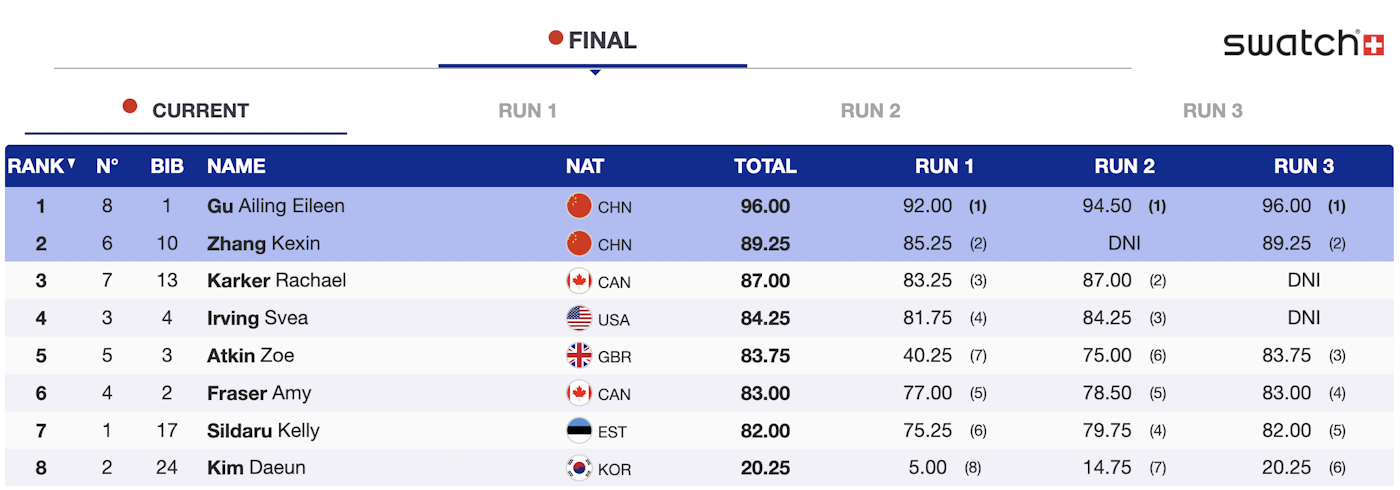
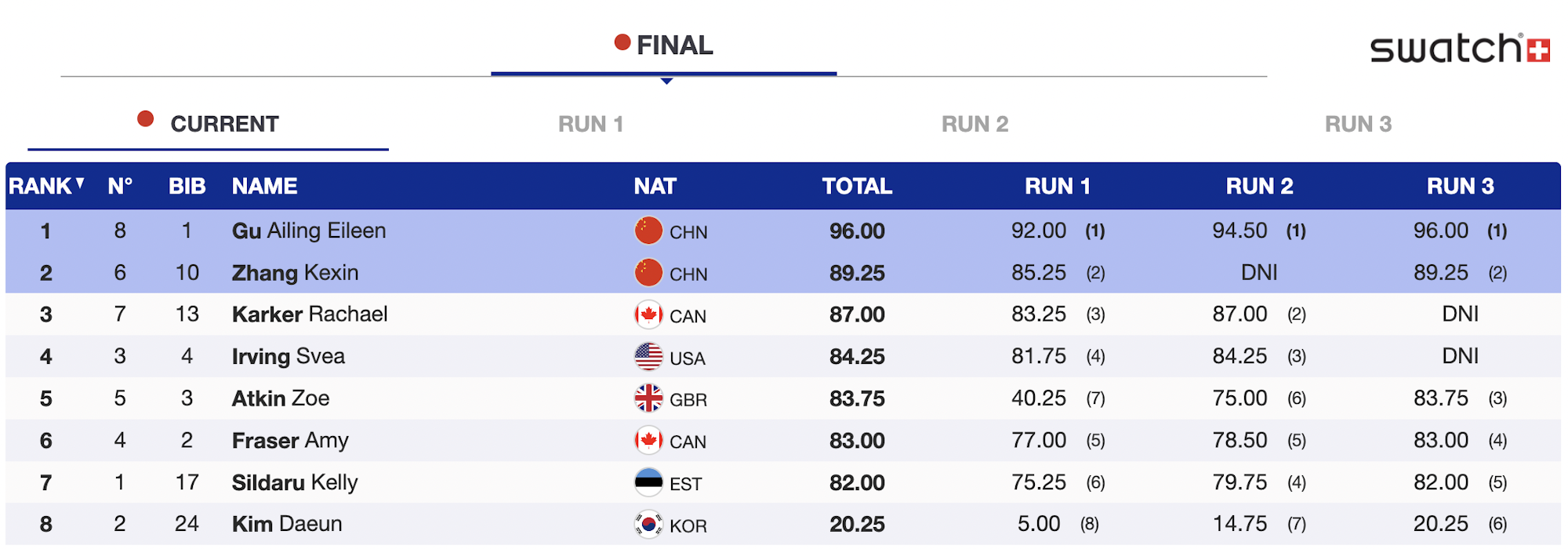
The battle for second place was a fierce match between China’s Zhang Kexin and Canada’s Rachael Karker. Zhang held the higher score after the first run with 85.25 while Karker sat just behind on 83.25. With Zhang unable to improve her score on run two, the Canadian leapfrogged ahead of her with 87 points but Zhang was able to answer with a score of 89.25 on her final run. The judges rewarded her for good trick variety and execution with the silver medal.
Karker didn’t improve on her second run score but was able to beat out the only American in the finals, Svea Irving, and finish the day in third place. With challenging conditions and fierce competition all around, it’s certainly too early to count out any of the latter finishers as we kick off the competition season. Kelly Sildaru, Zoe Atkin and Svea Irving are certainly worth keeping an eye on as we head into the fall and early winter.


Eileen Gu (center) stands atop the podium after claiming the Women’s Halfpipe win and setting a new record for most FIS Freeski World Cup wins. Kexin Zhang (left) grabbed silver and Rachael Karker (right) took home bronze.
This win, while one of many for Gu, was special. Not only did it cement her as the winningest skier in FIS Freeski World Cup history, but the location was a sentimental one. Her 15th World Cup win occurred right where she earned her first World Cup podium in 2019.
“It’s a full circle moment,” says Gu. “My 15th World Cup win back at the location of my first World Cup podium five years ago. It means so much. I think for me, skiing is always about pushing the next level so I was happy with the 92 on run one but I wanted to push it to 94 and then I wanted to push to 96. Every contest is a new challenge so having that resilience mentally and physically to compete and put it down when it counts… [that] keeps it fun and exciting. It’s what I love about skiing.”
Gu has quickly become one of the most prolific competitors in the history of the sport. She was the first woman to ever land a forward double cork 1440, doing so at just 18 years old. She’s also the youngest freeski Olympic champion to medal in all three major disciplines, taking home gold in halfpipe and big air, and silver in slopestyle during the 2022 Winter Olympics. This is even more astonishing when you consider the current caliber of competition in women’s freestyle skiing. She has been able to perform at the top of her class in multiple disciplines for several seasons, despite other skiers performing at an incredibly high level.
As the FIS Freeski World Cup circuit kicks off the 2024/25 season, we’re excited to see how far Gu pushes her legacy. She’s done a lot to bring skiing into the limelight, being one of the few riders to ever successfully balance mainstream culture with freeski excellence. She carries the same relentless work ethic off the snow too, studying quantum physics at Stanford University, and developing a career as a global fashion model. We’ll be sure to update you as the competition season rolls on, and as Gu, a seemingly unstoppable juggernaut, looks to claim more victories throughout the season.

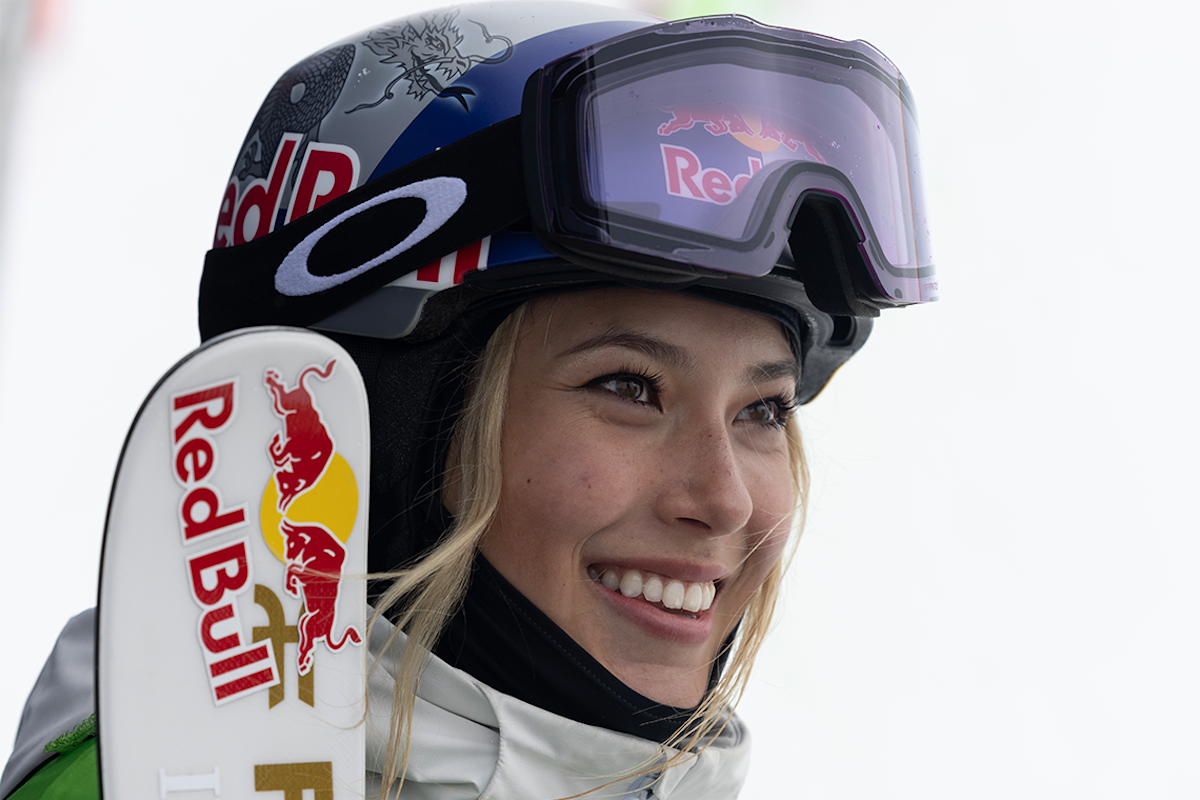

![[GIVEAWAY] Win Nordica's All-New Unleashed 106](https://www.datocms-assets.com/163516/1770321616-nordica.webp?w=200&h=200&fit=crop)
